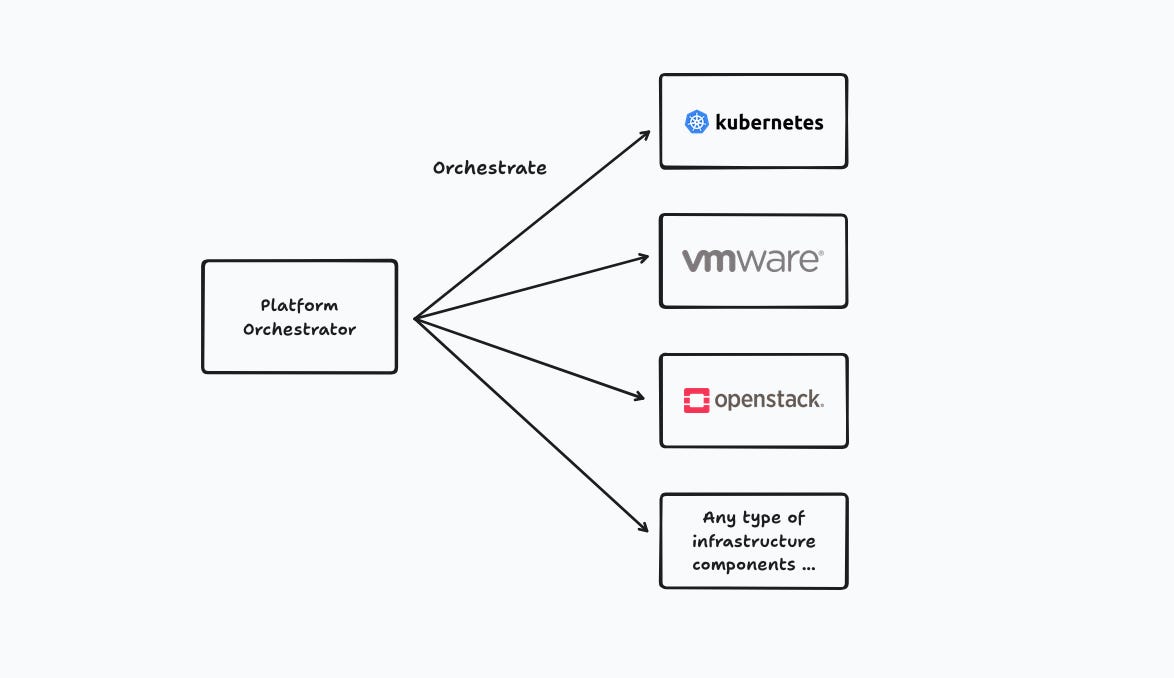Platform Tips #12: What's a Platform Orchestrator
What's a Platform Orchestrator; What are the specific challenges they address, and how they differ from Internal Developer Platforms.
Hey Folks 👋,
I'm Romaric Philogene, CEO and co-founder of Qovery, and this is my 12th post on my Substack. In my previous post, I shared some advice on not being shy and being inspired by the best product to build your developer platform 🤗.
Today, I want to dig into Platform Orchestrators, their significance, the specific challenges they address, and how they differ from Internal Developer Platforms (IDPs). By understanding these key components, organizations can make informed decisions to move forward, improve Developer Experience (DevEx), and ultimately 🥁… accelerate product development.
Understanding Platform Orchestrators
A Platform Orchestrator is a sophisticated tool that automates the coordination, management, and provisioning of software development infrastructure. It acts as the glue that binds disparate components of the software development lifecycle, from code deployment to monitoring, ensuring seamless integration and operation across various environments and tools.
Platform Orchestrators empower Platform Engineering teams to focus on crafting high-quality code by abstracting away the complexities of managing the underlying infrastructure.
The Rationale Behind Platform Orchestrators
The advent of Platform Orchestrators is a response to a set of challenges modern software development teams face. In an era characterized by the proliferation of different technologies and services, developers often find themselves navigating a labyrinth of tools and platforms. This fragmentation not only hampers productivity but also introduces risks related to inconsistency, misconfiguration, and security vulnerabilities.
Platform Orchestrators mitigate these issues by offering a unified API through which heterogeneous infrastructure components can be provisioned, managed, and orchestrated harmoniously.
Addressing the Challenges
Platform Orchestrators address several critical challenges:
Complexity Management: By automating the orchestration of infrastructure components, these solutions significantly reduce the complexity developers encounter in their workflows.
Consistency and Standardization: They enforce consistency across environments, ensuring that applications behave predictably from development to production.
Scalability and Flexibility: Offering scalable solutions that adapt to varying loads and requirements, Platform Orchestrators facilitate flexible deployment strategies.
Enhanced Collaboration: Streamlining the deployment and management process fosters better collaboration between development, operations, and quality assurance teams.
Internal Developer Platforms vs. Platform Orchestrators
While both Internal Developer Platforms (IDPs) and Platform Orchestrators aim to enhance the software development lifecycle, they serve distinct roles within the ecosystem. An IDP is a comprehensive suite that provides developers with pre-built capabilities, such as CI/CD pipelines, monitoring, and logging, customized to meet the specific needs of an organization. It is designed to deliver an optimal Developer Experience (DevEx) out of the box, abstracting the complexity of underlying infrastructure and tooling.
In contrast, a Platform Orchestrator focuses more on automating and integrating these disparate infrastructure components. It does not inherently provide the high-level tools and services found in an IDP. Instead, it facilitates the creation of an IDP by enabling platform engineers to weave together various tools and services into a cohesive platform. Thus, while an IDP incorporates and leverages an internal Platform Orchestrator to deliver its capabilities, the Orchestrator itself is more foundational, focusing on the orchestration layer that underpins the IDP's pre-built functionalities.
The Synergy Between IDPs and Platform Orchestrators
The relationship between IDPs and Platform Orchestrators is symbiotic. Platform Orchestrators lay the groundwork for the seamless integration of tools and services, upon which IDPs build to provide a rich, user-friendly interface and suite of tools for developers.

This layered approach ensures that while platform engineers have the flexibility and control to customize the orchestration of infrastructure components, developers are shielded from these complexities, enabling them to concentrate on writing code and delivering value.
Conclusion
Platform Orchestrators represent a strategic advantage to organizations seeking to optimize their deployment processes. By unifying and orchestrating the infrastructure, these solutions tackle the complexities and challenges inherent in modern software development head-on. They offer a seamless, integrated approach to managing a multitude of services and tools, which, in turn, enables businesses to foster a more agile, efficient, and resilient development pipeline. This streamlined orchestration not only accelerates the delivery of new features and applications but also ensures that the management of them is easier, scalable, and secure.
Some Platform Orchestrators to check out are Palantir Apollo, Qovery Engine, Prodvana, Humanitec.
Let's revolutionize Platform Engineering by putting developers first. Subscribe now to join me on this exciting journey!



